In Ibram X. Kendi’s stellar volume on the history of racist ideas in America, Stamped From the Beginning, he argues for Aristotle’s influence on colonial Puritan politicians and preachers. And without hesitation, Kendi moves quickly back to early Christianity, linking the apostle Paul to the Aristotelian thread of “superior” demographics, the “three-tiered of hierarchy slave relations—heavenly master (top), earthy master (middle), enslaved (bottom).” Kendi, then, quotes Paul from Colossians 3:22: Slaves, in all things obey those who are your masters on earth, not with external service, as those who merely please men, but with sincerity of heart, fearing the Lord. Is this, however, a fair characterization of Paul’s view on slavery? Still, why didn’t Paul just simply condemn slavery outright? Moreover, why didn’t Jesus and the NT writers directly address the cultural and social oppression of women, children, and slaves? Yet, perhaps they had. Imagine, still, just maybe they had something more noble in mind? Arguably, it was the presence of Christianity in the Roman Empire that turned socially accepted tiers of human hierarchies and practices up-side-down, albeit slowly penetrating the social fabric of the Greco-Roman world through the formation of a household platform (literally) that inaugurated a social mapping revolution. Some cast early Christianity as a protest movement against an oppressive, imperial empire, yet the apostolic and early church lacked any power or leverage for such social and cultural revolution. New Testament writers did not seek to overthrow authority structures wherein the gathered-church inhabited. Nonetheless, the household gathered-church, along with their table-fellowship (i.e., the common meal/the Lord’s Supper) and other early gathered-church practices (i.e., household baptism and kiss), was the platform for making known God’s cosmic reconciliation. In this paper, I suggest it was the narrative of the gospel as it intruded upon the Gentile world in the midst of the local, household gathered-church that changed everything--that more noble idea. It is my thesis that the gospel let loose (applied and socially forming) among household gathered-churches changed existing social mapping, worked out through the habitus taught and implied (i.e., trajectory application) by NT teaching. My concern is to hear how relevant narrative choices in Acts speak to the household gathered-church and how its habitus resulted in new social-mapping (forms and habits) consistent with the gospel and the meaning of the cross. This is a thread consisting of parts of a a recent paper presented at the 2017 Evangelical Theological Society's annual meeting in Providence, RI. The goal is to develop an anthology of essays (by various authors) on the subject, Christian Responses to Tyranny. Part 1 | Part 2a | Part 2b | Part 2c | Part 3 | Part 3a | Part 3b | Part 4a | Part 4b | Part 5 For the entire thread (remember to scroll backwards for previous posts) << Gathered-church >>
0 Comments
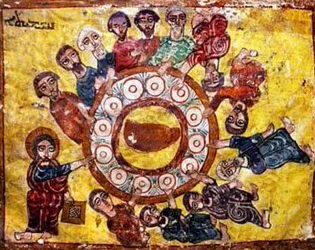 I am developing a paper (and chapter in a forthcoming book), "The Seditious Household: How Holy Kisses, Tables, and Other New Testament Practices Confronted Tyranny and Oppression." The paper will deal with how the early church--literally and more accurately, how early household-churches--leveraged their only power, namely their open (everyone welcome) house-church gatherings, against the powers of oppression and slavery. We, today, need to rethink our strategy or all we do is trade powers (theirs) for another power (ours), exchange one oppressor (them) for another (us). The big question for Jesus followers is how did he conquer and change what the powers had control over: through a Holy Kiss, a Table, Baptism(s), and Households. We need to return to that Holy Kiss, that Table, Baptism(s), and Households. ReRead the Acts and you'll get a hint. Jesus, the NT Jesus anyway, isn't simply a spiritual adviser; he is a king and a priest and a prophet, making him aversive--an political opponent to the powers in place in his day (which did not have any wall, fence, or divide between "church" (i.e., religion) and state. His life, the cross, and the resurrection confronted, disarmed, and overturned all the powers contrary to God's rule and reign. Recent research has acknowledged the “mission” and “witnessing” were not actually sited as the purpose or compulsion for the early church. Combine this with the clear fact that we have in Acts of the Apostles only the leadership—and actually only a few here and there—publically proclaiming the gospel. Inspired narrative doesn’t give us a picture of early church Christians “gossiping” the gospel, or offering a “Four Spiritual Laws” or even an Evangelism Explosion “If you were to die . . . what reason would you give for God to allow you into his heaven?” approach. What we do find is the gathering of unlikely participants—slaves, children, woman, along with the men, and the increasing of differing ethnic backgrounds—gathering on equal ground around a meal in a household, multiplying throughout the Roman Empire. Regarding slavery, my thinking was affirmed by a book review I read: despite our wish that Jesus and Paul had simply announced the evil of slavery (which they did not, at least in a clear way we’d appreciate and proof-text), we need to understand that they were after something higher, something more significant. (More important than ending slavery, condemning slavery! you might be tempted to judge too quickly.) Jesus and Paul upped the ante to a much more noble idea, the dignify of being a human being. Paul and Jesus (and Luke in Acts for that matter) had something much more ambitious (as the book being reviewed had stated) than advocating for slaves to be legally free (which would have been good for our comfort levels and political agendas, but actually not so much at that time for slaves). First and foremost, Paul and Jesus wanted the church to see slaves as human beings. They wanted to make them into human beings. This—slaves along with making children and women—into human beings (which they had always been, but you know what I mean)—is what changed everything, unhinged an empire, and its shadow (this approach and paradigm modeled by Jesus and the NT writers) has caste itself as the gospel moved demographically and geographically. This should be what the church is about: making others, especially the marginal, the oppressed, and disenfranchised into human beings. Albeit, the first mentioned of those being baptized in Acts is after the Spirit fell in chapter 2, but Luke’s narrative choices about baptisms is quite informative: Samaritans (“men and women”), an Ethiopian eunuch, the oppressor, Christian killer Saul, a military Gentile, a Gentile woman (and “her household”), a Gentile Jailor (and “his household”), and a outlier, Corinthian Jew with a Gentile name, Crispus (and “all of his household”) are the list Luke gives of those who were baptized. I didn’t include Simon, the magician, for his baptism was a fake, not real, and was used for his gain, not for entrance into the faith. Of course there are multitudes more, but when Luke has a chance to display and write about baptisms of believers in Messiah Jesus, these are the one’s he tells us about. The first time he mentions a believer being baptized after Pentecost it is Samaritan men and women; and the first time Luke tells us about an individual who believes and is baptized it is an foreign-gentile, eunuch, serving a pagan king. Not stop and think—what is the story, Luke’s narrative decisions, telling us about baptism and the spread of Christianity? "Though the Spirit continues to move, the assembly that is described in the New Testament with all the believers in the one fellowship of Jesus Christ and meeting in homes, house by house, is almost completely neglected. The true assembly has no hierarchy, nor man’s organization. Hierarchy is defined as levels of authorities to direct and control believers. All the various ministries should be for the building up of the assembly, but instead the opposite occurs. Whole churches are formed around various ministries. Not only are major denominational churches formed around powerful ministers such as Luther, Calvin and Wesley but also every church today is centered on the ministry of a particular teacher or preacher." - Henry Hon
The small, powerless, nothing for leverage young church grew; they believed they were actually citizens of the kingdom that Jesus preached and now they, too, were to announce it too . . . and it seems that they did so through gathering together--this unique community of poor, landowners, business women, slaves, children, ex-prostitutes, former cult and current military leaders, and women--gathered meals in households through Caesar's empire and, eventually, beyond. The gathered church that met “house to house,” in a family’s meal room was the platform for both proclamation of the gospel (in instruction and in reenacting the Lord’s Supper as part of a communal meal) and, as well, a seditious act against Caesar, the god’s of the empire, and the tyranny of oppressive forms of de-humanization. For the Cup was raised for a dead (but now alive) insurrectionist rather than for Caesar, the gods of Rome, or local family deities. The Broken and shared Bread was a declaration, not of Caesar’s provision or pf the gods, but of the dead (but now alive) insurrectionist’s provision for the forgiveness of sins—for all people. For, the leverage of the gospel proclaimed and enacted in the household-church gathering (the church’s only leverage) was who reclined (yes, actually reclined) at table for fellowship and eating and drinking. Breaking every known cultural and social etiquette and acceptability of the day, of the empire. The church’s only leverage for its seditious church gathering around the meal and the Cup and the Broken Bread was a gathering of a community of poor, landowners, business women, slaves, children, ex-prostitutes, former cult and current military leaders, and women. The form of the household church gathered (literally reclining) around a table and eating and drinking was a true and faithful representation (literally an outcome) of the gospel of Jesus, the Messiah. Moving the gathered believers away from homes and into addressed, concrete buildings and removing the meal-feast-banquet from the center of the gathered who came for worship, fellowship, and instruction were the first moves for the church away from caring for the poor upfront and personal; and, the first step in refusing to believe Jesus' words, "the poor, you will always have among you."
|
AuthorChip M. Anderson, advocate for biblical social action; pastor of an urban church plant in the Hill neighborhood of New Haven, CT; husband, father, author, former Greek & NT professor; and, 19 years involved with social action. Archives
February 2024
Categories
All
|
Pages |
More Pages |
|
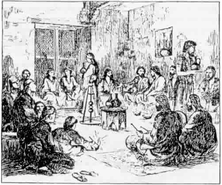
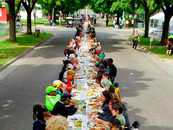
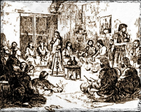
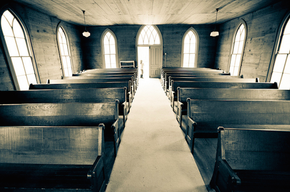
 RSS Feed
RSS Feed